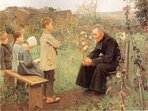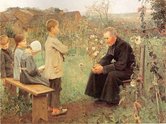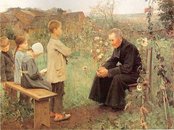 The Heidelberg Catechism: Lord's Day 28 75. Question: How does the Lord's Supper signify and seal to you that you share in Christ's one sacrifice on the cross and in all His gifts? Answer: In this way: Christ has commanded me and all believers to eat of this broken bread and drink of this cup in remembrance of Him. With this command He gave these promises:[1] First, as surely as I see with my eyes the bread of the Lord broken for me and the cup given to me, so surely was His body offered for me and His blood poured out for me on the cross. Second, as surely as I receive from the hand of the minister and taste with my mouth the bread and the cup of the Lord as sure signs of Christ's body and blood, so surely does He Himself nourish and refresh my soul to everlasting life with His crucified body and shed blood. [1] Matt. 26:26-28; Mark 14:22-24; Luke 22:19, 20; I Cor. 11:23-25. 76. Question: What does it mean to eat the crucified body of Christ and to drink His shed blood? Answer: First, to accept with a believing heart all the suffering and the death of Christ, and so receive forgiveness of sins and life eternal.[1] Second, to be united more and more to His sacred body through the Holy Spirit, who lives both in Christ and in us.[2] Therefore, although Christ is in heaven[3] and we are on earth, yet we are flesh of His flesh and bone of His bones,[4] and we forever live and are governed by one Spirit, as the members of our body are by one soul.[5] [1] John 6:35, 40, 50-54. [2] John 6:55, 56; I Cor. 12:13. [3] Acts 1:9-11; 3:21; I Cor. 11:26; Col. 3:1. [4] I Cor. 6:15, 17; Eph. 5:29, 30; I John 4:13. [5] John 6:56-58; 15:1-6; Eph. 4:15, 16; I John 3:24. 77. Question: Where has Christ promised that He will nourish and refresh believers with His body and blood as surely as they eat of this broken bread and drink of this cup? Answer: In the institution of the Lord's supper: The Lord Jesus on the night when He was betrayed took bread, and when He had given thanks, He broke it and said, "This is my body which is for you. Do this in remembrance of me." In the same way also the cup, after supper, saying, "Do this, as often as you drink it, in remembrance of me." For as often as you eat this bread and drink the cup, you proclaim the Lord's death until He comes (I Corinthians 11:23-26). This promise is repeated by Paul where he says: The cup of blessing which we bless, is it not a participation in the blood of Christ? The bread which we break, is it not a participation in the body of Christ? Because there is one bread, we who are many are one body, for we all partake of the one bread (I Corinthians 10:16, 17).
0 Comments
 The Heidelberg Catechism: Lord's Day 16 40. Question: Why was it necessary for Christ to humble Himself even unto death? Answer: Because of the justice and truth of God[1] satisfaction for our sins could be made in no other way than by the death of the Son of God.[2] [1] Gen. 2:17. [2] Rom. 8:3; Phil. 2:8; Heb. 2:9, 14, 15. 41. Question: Why was he buried? Answer: His burial testified that He had really died.[1] [1] Is. 53:9; John 19:38-42; Acts 13:29; I Cor. 15:3,4. 42. Question: Since Christ has died for us, why do we still have to die? Answer: Our death is not a payment for our sins, but it puts an end to sin and is an entrance into eternal life.[1] [1] John 5:24; Phil. 1:21-23; I Thess. 5:9, 10. 43. Question: What further benefit do we receive from Christ's sacrifice and death on the cross? Answer: Through Christ's death our old nature is crucified, put to death, and buried with Him,[1] so that the evil desires of the flesh may no longer reign in us,[2] but that we may offer ourselves to Him as a sacrifice of thankfulness.[3] [1] Rom. 6:5-11; Col. 2:11, 12. [2] Rom. 6:12-14. [3] Rom. 12:1; Eph. 5:1, 2. 44. Question: Why is there added: He descended into hell? Answer: In my greatest sorrows and temptations I may be assured and comforted that my Lord Jesus Christ, by His unspeakable anguish, pain, terror, and agony, which He endured throughout all His sufferings[1] but especially on the cross, has delivered me from the anguish and torment of hell.[2] [1] Ps. 18:5, 6; 116:3; Matt. 26:36-46; 27:45, 46; Heb. 5:7-10. [2] Is. 53.  The Heidelberg Catechism: Lord's Day 15 37. Question: What do you confess when you say that He suffered? Answer: During all the time He lived on earth, but especially at the end, Christ bore in body and soul the wrath of God against the sin of the whole human race.[1] Thus, by His suffering, as the only atoning sacrifice,[2] He has redeemed our body and soul from everlasting damnation,[3] and obtained for us the grace of God, righteousness, and eternal life.[4] [1] Is. 53; I Tim. 2:6; I Pet. 2:24; 3:18. [2] Rom. 3:25; I Cor. 5:7; Eph. 5:2; Heb. 10:14; I John 2:2; 4:10. [3] Rom. 8:1-4; Gal. 3:13; Col. 1:13; Heb. 9:12; I Pet 1:18, 19. [4] John 3:16; Rom. 3:24-26; II Cor. 5:21; Heb. 9:15. 38. Question: Why did He suffer under Pontius Pilate as judge? Answer: Though innocent, Christ was condemned by an earthly judge,[1] and so He freed us from the severe judgment of God that was to fall on us.[2] [1] Luke 23:13-24; John 19:4, 12-16. [2] Is. 53:4, 5; II Cor. 5:21; Gal. 3:13. 39. Question: Does it have a special meaning that Christ was crucified and did not die in a different way? Answer: Yes. Thereby I am assured that He took upon Himself the curse which lay on me, for a crucified one was cursed by God.[1] [1] Deut. 21:23; Gal. 3:13. |
The Heidelberg
|
 RSS Feed
RSS Feed
